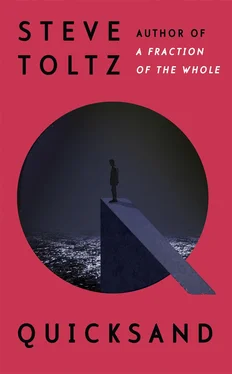— And that’s why you split up?
— He didn’t have good people skills. Isn’t that a weird idea? I mean, you can imagine a horse or a wild dog needing people skills, but that actual people need people skills points to some fucked-up fundamental error in our makeup, don’t you think?
— So that’s why you split up?
— God Aldo, you make it sound so weird. Everyone has three or four relationships they’re ashamed of.
— Three or four? That sounds like a lot.
— He was a generous guy, but really lazy. He would give you the shirt off his back, then ask you to wash it.
— Where is he now?
— In prison.
Prison! Your Honour! I felt like a moth pinned to a wall in a serial killer’s basement. Something you should know: I have always perceived our society as a narrow bridge, either side of which lie two other societies — the prison, the hospital. To finally fall into the horror of the prison or the horror of the hospital was my greatest fear. Mimi’s revelation deeply rattled me and we stood a while longer as the sun beat down like profound hatred, and her dark, sensual eyes gave off sparks — you all know the psychosexual allure of emotional distress — and I gazed at a long row of black trees flexing in the strong wind and became more acutely aware that we were standing on ground filled with clean bones without their lumps of meat, now just instruments in a caveman’s symphony. When Mimi began the trek back to the car, I walked beside her in deliberate silence. In the case of the revelation of a person’s deepest sadness, you can’t ruin it by making small talk or asking anything other than the one question the person wants you to ask, but I hadn’t figured out what that was yet.
— Are you OK? I asked when we were in the car.
— No time for self-pity, she answered, as if feeling sorry for oneself was only a matter of scheduling.
XV
Back in the bedroom, Mimi stretched out on the bed.
— What are you looking at?
— You.
— How do I look?
— Svelte.
— Do you want to see what Elliot looks like?
— Not especially.
She pulled out a photo of a beautiful man in a top hat and jeans and black eye makeup and sandals: four decades in one outfit. He was an athletic acrobat/dancer type, skinny yet muscular; he looked like he could do a backflip from a first-floor balcony onto the saddle of a horse.
— What is he, a rodeo clown?
— No. A wonderful street performer. Endearing singer. Terrific juggler. So-so fire-twirler. Unexceptional unicyclist and humdrum contortionist, but more than adequate trapeze artist and just a downright fabulous stilt-walker. Most of all, an outstanding performance artist and an inspiring director of physical theatre.
— Jesus help us all.
— Do you want to hear his voice?
— I could live without it.
Mimi rang a number and put her phone to my ear.
— Hi, the voice said, this is Elliot. I’m not here right now but if you leave your name and number I’ll get back to you in three to five years.
— Sad.
— Manslaughter, possession of narcotics, resisting arrest, she said, as though those salient facts spoke for themselves. She backtracked. Elliot was carrying thirty-one ecstasy tablets en route to a fundraiser for his latest production. He ran a red light and when a police siren started up, he fled, killing a pedestrian. The sadness of the tale was how quickly the whole saga could be synopsised. Until his imprisonment they’d not spent a single night apart. I thought: I’m a bed warmer, nothing more. She backtracked further. When she was about thirty, she took an acting workshop. He was directing physical theatre in wife-beaters. They fell in love, lived together in a campervan, sloshed around mud festivals in Andalucía and Avignon; she became his official photographer. Other than adding scars and gashes and assorted physical impairments to famous artworks — his ultimate aspiration: to paint a nosebleed on the Mona Lisa —one of Elliot’s ‘performances’ was to place ads in industry magazines for actors to perform in a lavish outdoor theatrical production of Triumph of the Will , and then film whoever turned up, she said. Another ‘performance’ was held in small villages across Eastern Europe; Elliot would go into a village and start rumours that his sister was possessed by the devil, and let the word spread until some overfed shaggy priest with ancient stinks and gristle on his face made the journey to whatever fly-ridden room they were holed up in and carried out the exorcism, which was captured on film by the crew. Mimi was exorcised six times in total.
— You were actually exorcised?
— Sure.
I silently diagnosed Elliot as having a clear narcissistic personality disorder.
He was the one who brought her to the residence, she explained, weeping for her precious, sensitive performance artist whose natural domain was long grass on an embankment by a river. She said his ponytail was removed for the pre-trial hearing, then opened an abridged copy of The Brothers Karamazov and pulled out the ponytail. I had a frisson of pleasure listening to her story but I was none too pleased to fondle this acrobat’s ponytail. Then in a quiet yet hysterical voice she returned to that fateful night. Why did he try to outrun the police? I asked. He had an uncompromising moment and poorly negotiated a sudden bend in the pitch-black night. Maybe he capitulated to an impulse he’d seen on television, a narrative impulse to run. She backtracked again. The story changed as she was telling it; she added more details now, circling closer to the truth.
— It was me.
— It was you what?
— I yelled, Go! Quick!
Why had she yelled? And why had he thoughtlessly obeyed? She didn’t know.
— And now he’s in prison and he’s going crazy , she said in a whisper that seemed to come through her chest wall from her heart itself. He’s getting pushed around. He’s getting, you know.
I knew.
— I mean, it’s taken its toll. He’s not the same. It’s changing him. He’s getting beaten! He’s getting, you know!
I knew.
Mimi clasped one hand over her mouth as if to stop toxic levels of distress from leaking out. I didn’t know how to react; the panicky obsession I’d always had with prison clouded my thought processes. It was also clear she admired and loved Elliot intensely, loved them intensely, as a couple. My role in all this? To love her for five years. Three for good behaviour. But why was I worried? The elephant in the room was behind bars! Yet he was the proprietor of her heart. I was the tenant. And the rent kept going up. I thought: My cock is being used as a placeholder for his. I thought: Who wants to mess about with a devotion like that? Yet I knew I was going to squeeze out an incautious remark. I took her hand.
— I love you.
ALL RIGHT, ladies and gentlemen of the jury, it is now we get to the prosecutor’s pet word: motive. The crux of his flimsy case. The prosecutor can’t seem to go on about it enough. I killed her in a jealous rage. That was my motive. Jealousy. Well, I can’t deny the sad fact of it: I was jealous.
— I love you too, she said, yet when I undressed her moments later, it was like peeling bark off a rotten tree. I nibbled a piece here, a piece there, licked the sweat that glistened on her throat, searched for a remote part of her, any uncharted territory, but overall sex with Mimi that night was like strutting into a condemned building at the moment of demolition.
— I’m glad I don’t have to hide this from you anymore, she said afterwards.
— Hide what?
From underneath the bed, she dragged a couple of dozen white sheets of paper and sat on the floor cross-legged, applying lipstick and covering the paper in kisses — twenty or thirty pages of kisses — and when she was done, placed them in a manila envelope addressed to Elliot Grass c/o Silverwater Correctional Complex.
Читать дальше











